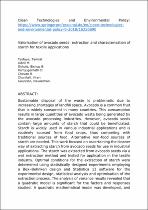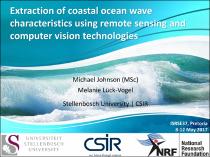 ResearchSpace
ResearchSpace
A comparative study of supercritical fluid extraction and accelerated solvent extraction of lipophilic compounds from lignocellulosic biomass
JavaScript is disabled for your browser. Some features of this site may not work without it.
- ResearchSpace
- →
- Research Publications/Outputs
- →
- Journal Articles
- →
- View Item
A comparative study of supercritical fluid extraction and accelerated solvent extraction of lipophilic compounds from lignocellulosic biomass
The Box-Behnken experimental design technique investigated a comparative study of supercritical fluid extraction (SFE) and accelerated solvent extraction (ASE) of lipophilic compounds from pinewood sawdust. A response surface methodology was used to examine the effect of independent parameters and optimize the extraction yield of lipophilic compounds. The results showed that the increase in extraction temperature used for ASE positively influenced the yield of lipophilic compounds, whereas an increase in the flow rate of the cosolvent at temperature 50 °C, and pressure of 300 bar increased the yield achieved by SFE. The experimental data's quadratic polynomial models gave a coefficient of determination (R2) of 0.87 and 0.80 for ASE and SFE, respectively. The optimum conditions of ASE were temperature (160 °C), static time (12.5 mins), and static cycle (1), which resulted in a maximum yield of 4.2%. The optimum SFE conditions were temperature (50 °C), pressure (300 bar), carbon dioxide (CO2) flow rate (3.2 ml/min), and a 2 ml/min cosolvent flow rate that yielded 2.5% lipophilic compounds. ASE yielded higher extraction efficiency than SFE. Fourier transform infra-red (FTIR) spectroscopy and thermal analyses TGA/DSC evaluated the ultimate analyses of the lipophilic extracts. The FTIR results confirmed the presence of aliphatic groups, hydroxyl groups, and carboxyl groups. The thermal analysis showed that the degradation temperature of the lipophilic compounds occurred between 250 and 450 °C. Thereafter, Pyrolysis-Gas Chromatography Mass Spectrometry (Py-GC/MS) was used to identify the lipophilic compounds, which showed that the extracts were rich in fatty acids and terpenes.
Reference:
Khanyile, A., Andrew, J.E., Paul, V. & Sithole, B.B. 2022. A comparative study of supercritical fluid extraction and accelerated solvent extraction of lipophilic compounds from lignocellulosic biomass. Sustainable Chemistry and Pharmacy, 26. http://hdl.handle.net/10204/13593
Khanyile, A., Andrew, J. E., Paul, V., & Sithole, B. B. (2022). A comparative study of supercritical fluid extraction and accelerated solvent extraction of lipophilic compounds from lignocellulosic biomass. Sustainable Chemistry and Pharmacy, 26, http://hdl.handle.net/10204/13593
Khanyile, AT, Jerome E Andrew, V Paul, and Bishop B Sithole "A comparative study of supercritical fluid extraction and accelerated solvent extraction of lipophilic compounds from lignocellulosic biomass." Sustainable Chemistry and Pharmacy, 26 (2022) http://hdl.handle.net/10204/13593
Khanyile A, Andrew JE, Paul V, Sithole BB. A comparative study of supercritical fluid extraction and accelerated solvent extraction of lipophilic compounds from lignocellulosic biomass. Sustainable Chemistry and Pharmacy, 26. 2022; http://hdl.handle.net/10204/13593.
May 2022
Pinewood sawdust
Response surface methodology
Green extraction techniques
Supercritical fluid carbon dioxide
Lipophilic extractives
Accelerated solvent extraction
Response surface methodology
Green extraction techniques
Supercritical fluid carbon dioxide
Lipophilic extractives
Accelerated solvent extraction
Files in this item
Source
Sustainable Chemistry and Pharmacy, 26
Related Items
This item appears in the following Collection(s)
Related items
Showing items related by title, author, creator and subject.
-
Author: Tesfaye, Tamrat ; Gibril, M ; Sithole, Bishop B ; Ramjugernath, D ; Chavan, R ; Chunilall, Viren ; Gounden, Navandran Date: 2018 Sustainable disposal of the waste is problematic due to increasing shortages of landfill space. Avocado is a common fruit that is widely consumed in many countries. This consumption results in large quantities of avocado waste being generated ... Read more
-
Author: Johnson, M ; Lück-Vogel, Melanie Date: May 2017 The coastal zone occurs at the interface of three major natural systems. These systems include the atmosphere, the ocean and the land surface. Ocean waves are among the most important forces shaping the world¿s coastlines. They drive environmental ... Read more
-
Author: Malaka, MS ; Naidoo, Kersch ; Kabuba, J Date: Apr 2017 Siphonochilus aethiopicus is an indigenous South African plant also known as African ginger. It has often been used for its medicinal properties to treat various ailments such as flu, colds, and so forth. The research aim of this study was ... Read more
Browse
-
All of ResearchSpace
-
This Collection
Legislation and compliance
General Enquiries
Tel: + 27 12 841 2911
Email: callcentre@csir.co.za
Physical Address
Meiring Naudé Road
Brummeria
Pretoria
South Africa
Postal Address
PO Box 395
Pretoria 0001
South Africa
Copyright © CSIR 2017. All Rights Reserved
Resources on this site are free to download and reuse according to associated licensing provision. Please read the terms and conditions of usage of each resource.







